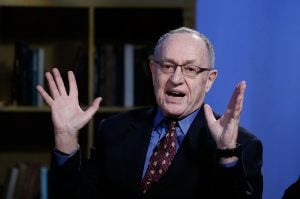Court Refuses To Toss Sanctions For Alan Dershowitz In Election LOLsuit For Kari Lake
But he did get a haircut on the award. And his dignity.

(Photo by John Lamparski/Getty Images for Hulu)
Six weeks ago, Alan Dershowitz asked a federal judge to postpone ruling to allow him time to write a law review article explaining why he shouldn’t be sanctioned.

AI’s Impact On Law Firms Of Every Size

The case was one of Arizona gubernatorial candidate Kari Lake’s endless stream of garbage election lawsuits. After promising to “sue all the machines,” Pillow Fluffer Mike Lindell dispatched Andrew Parker and MAGA troll Kurt Olsen, the legal dream team that represents him in all matters civil and criminal, to work their magic for Lake. And they brought along Dershowitz for the ride!
To call the case ill-conceived is like saying the Hindenberg encountered some light turbulence. Lake and Finchem, the failed Republican secretary of state candidate, claimed that the ballot tabulation machines were never tested and sued to force the state to use all paper ballots, counted by hand. As Judge John Tuchi noted in his dismissal: 1) the machines are tested repeatedly before and after the election; 2) the state already uses paper ballots for every single vote, something which anyone observing the 2020 recount in Maricopa County could see; and 3) said recount, cited by the plaintiffs as “proof of concept,” took six months, and only served to prove that hand tabulation could not possibly be completed in time to report the result by the statutory deadline.
The Maricopa County defendants moved for sanctions and legal fees, and Judge Tuchi agreed, writing:
[A]ny objectively reasonable investigation of this case would have led to publicly available and widely circulated information contradicting Plaintiffs’ allegations and undercutting their claims. Thus, Plaintiffs either failed to conduct the reasonable factual and legal inquiry required under Rule 11, or they conducted such an inquiry and filed this lawsuit anyway. Either way, no reasonable attorney, “after conducting an objectively reasonable inquiry into the facts and law, would have found the complaint to be well-founded.”
Sponsored

AI’s Impact On Law Firms Of Every Size


Law Firms Now Have A Choice In Their Document Comparison Software

Why Do AI And Legal Professionals Make The Perfect Partnership?


Law Firms Now Have A Choice In Their Document Comparison Software
Dershowitz then fired off an absolute frenzy of motions claiming that he had simply been a consultant on the case, was tricked by the court clerk into filing a pro hac vice motion, only appeared as “Of Counsel” and was thus unfamiliar with the pleadings which bore his signature, and was too old and sick to be sanctioned.
Judge Tuchi actually granted Dershowitz a show cause hearing, although he refused to grant extra time to dummy up a law review article explaining why eminent professors should receive immunity to rent out their signatures to give garbage lawsuits a patina of legitimacy.
And in the end, the court was not persuaded by any of Dersh’s arguments, writing in a sanctions order on Friday afternoon:
Whether Mr. Dershowitz signed, or intended to sign, those filings as “counsel” or “attorney” or “of counsel,” he signed them. And he effectively conceded that he authorized his signature on these filings without investigating whether they were legally and factually sound. If there was any doubt this brought him within the ambit of Rule 11, the evidence detailed above demonstrates that all parties involved understood the value of his signature. It was an agreed-upon part of his retention. It led opposing counsel and the public to believe he represented Plaintiffs in this matter—a notion furthered by Plaintiff Lake and Mr. Lindell themselves. Mr. Dershowitz did not do anything to dispel this notion until after the Maricopa County Defendants moved for sanctions. Further, he participated in at least one telephonic conference with opposing counsel; his telephonic presence was announced at the one hearing on the merits; and, according to Mr. Parker, he reviewed and provided feedback on at least the FAC.
But Dersh didn’t walk away totally empty-handed from this order. While the court refused to let him off the hook for Rule 11 sanctions, it did let him skate on the § 1927 sanctions for unnecessary multiplication of the proceedings, since Dershowitz appeared to be less involved in the motion for preliminary injunction filed just a couple of months before election day and demanding that the court impose drastic changes on the state’s ballot procedures.
Sponsored

Gain An Instant Understanding Of New Complaints With LexisNexis Snapshot

Diving Into Generative AI: A Practical Guide For Law Firms Starting From Scratch
“While Mr. Dershowitz’s signature on the MPI and subsequent filings arguably toed the line of recklessness, the Court finds it fell closer to the side of negligence, which is insufficient for section 1927 liability,” Judge Tuchi wrote. So in the end, the professor is only liable for ten percent of the $122,200 attorney’s fees awarded.
He’ll still have the Rule 11 sanctions on his record but … maybe he can distract himself by writing that law review article after all.
Lake v. Fontes [Docket via Court Listener]
Liz Dye lives in Baltimore where she writes about law and politics and appears on the Opening Arguments podcast.







